How Poppi Hijacked Love Island and Beat the Brands Who Paid to Be There

When Love Island USA Season 7 aired this summer on Peacock, it wasn’t just a dating show—it was a masterclass in brand marketing, cultural relevance, and meme momentum. With millions tuning in and even more scrolling through TikToks, tweets, and Reddit threads, Love Island has solidified itself as one of the most valuable cultural platforms for brands trying to reach Gen Z and millennial audiences.
But what happens when the most successful brand moment of the season didn’t even come from an official sponsor?
Let’s break it down.
The Rise of Love Island as a Cultural Megaphone
Love Island USA has grown from reality TV guilty pleasure to a full-blown marketing machine. Season 7 was no exception, drawing millions of social media impressions, sparking daily meme cycles, and giving brands an on-ramp to Gen Z’s heart via slow-burn love triangles, explosive Casa drama, and beauty tutorials in the glam room.
NBCUniversal and Peacock loaded the villa with brand partners: CeraVe, Maybelline, Jose Cuervo, and e.l.f. Cosmetics among them. These integrations ranged from product placements in the dressing room to themed ad spots and even interactive challenges built around the brand’s identity (like Maybelline’s Kissing Challenge).
On paper, it was the perfect brand content engine. But the actual breakout moment? It came from outside the villa.
Poppi and the “Amaya Papaya” Effect
Poppi, a prebiotic soda brand with no in-villa placement and zero official affiliation, pulled off one of the most effective guerrilla marketing moves of the summer.
As fan-favorite contestant Amaya Espinal rose to prominence on the show, fans lovingly dubbed her “Amaya Papaya”. Poppi jumped on the trend and posted a mock-up of a new flavor: “Amaya Papaya.” It included on-brand phrases like “sensitive gangsta” and inside jokes that only real Love Island fans would catch.
The post went viral. Fans begged for the flavor to become real. Media outlets like People and Parade covered it. Even Peacock’s official account joined the comments. Poppi became part of the Love Island discourse—without spending a dollar on sponsorship.
It wasn’t just opportunistic marketing—it was fandom fluency.
Poppi didn’t talk at the audience. It spoke with them. It created content that felt like it came from inside the villa itself, a move that resonated far more deeply than traditional product placement.
Who Sponsored, and Who Was Forgotten
Meanwhile, official sponsors like CeraVe and Maybelline had prominent screen time and were integrated into routines and challenges. But headline volume and social chatter didn’t reflect that same impact. According to media coverage data:
- CeraVe and Maybelline each had only 2 headlines referencing their Love Island activation.
- e.l.f. Cosmetics had 37 mentions, likely boosted by its built-in Gen Z following.
- Poppi and “Amaya Papaya” generated 140+ headlines, social mentions, and articles—despite not being a sponsor.
This isn’t just a case of who was louder—it’s a case study in how simple product placement is far less valuable when it’s not paired with an organic engagement strategy and follow-through content.
Brands like CeraVe and Maybelline showed up, but didn’t continue the conversation. Without interactive content, viral hooks, or social amplification, their presence felt more like a background prop than a cultural contributor.
In other words, showing up wasn’t enough. The brands that actually spoke the audience’s language and stayed in the conversation were the ones that broke through.
Pancake Gate: The Opportunity That Got Away
Another cultural flashpoint? Pancakes.
Contestant Huda confronted Jeremiah after learning he made two pancakes (with a flower!) for Chelley, while she got one. The internet lost it. Fans memed the moment. Page Six covered it. Reddit lit up.
And yet—no brand jumped in.
Where was Blackstone, sliding in with a tongue-in-cheek TikTok: “Jeremiah, we made some post-breakup pancakes for you.”
Where was Ninja, showing off their griddle or blender for the Islanders’ iconic frozen margarita nights? The villa kitchen is practically a content studio. Yet few appliance or food brands used the social traction of these scenes to activate anything meaningful.
What This Means for Brand Strategists
Love Island is no longer just a show. It’s a cultural moment machine. And in a world where attention is currency, brands don’t need to outspend—they need to outsmart.
The playbook isn’t about logos on screen. It’s about being part of the conversation, in real-time, in ways that feel authentic and playful.
Whether it’s a made-up soda flavor, a pancake spat, or a viral kissing challenge, the brands that win are the ones that:
- Monitor social conversations and memes in real-time
- Speak in the audience’s voice
- Prioritize relevance over reach
- Aren’t afraid to jump into fandom spaces
Warning Signals From the Fandom
While Season 7 saw strong ratings, fan conversations across Reddit, Twitter, and media commentary raised some red flags for the show’s long-term health:
- Casting controversies: Two contestants were removed due to resurfaced racist content. Others were criticized for prior political affiliations or toxic behavior. Fans widely questioned the vetting process and called out the producers.
- Staged or shallow connections: Many felt the show lacked authentic romance. Fans missed key format elements like Movie Night, real dates, or meaningful hideaways—saying the show felt rushed and emotionally thin.
- Influencer-first casting: Contestants were perceived as clout-chasers rather than love-seekers. Fans were disillusioned with how many cast members already knew each other or seemed pre-selected for drama.
- Overproduction and scripted energy: Several threads accused producers of being too hands-on, forcing plotlines instead of letting natural connections unfold.
Yes, the numbers were strong. But fans were vocal: if producers don’t take their concerns seriously, the audience will check out fast.
Final Word: The Brands That Get It, Win It
Poppi didn’t just win the summer’s Love Island buzz—they wrote the new rules of brand storytelling.
So if you’re a brand manager, CMO, or content strategist eyeing your next cultural activation, remember this:
You don’t need to be in the villa to be part of the story. You just need to know when the pancakes hit the fan.
Angus Nguyen
Angus Nguyen is the Director of Marketing at Fullintel and a proud member of the “I read the AI Overviews so you don’t have to” club. He spends his days obsessing over media measurement, digital trends, and why your best-performing PR story might be invisible to AI. With 7+ years of experience in brand strategy and media intelligence, Angus helps comms teams future-proof their visibility in an AI-first world. When he’s not decoding Google’s latest algorithm update, he’s probably hunting down the best bánh mì in Toronto—or creating viral content about it.
📌 Follow Angus for fresh takes on AI media monitoring, PR analytics, and the future of brand visibility.
Angus Nguyen, Director of Marketing at Fullintel, specializes in data-driven public relations and media monitoring. His experience analyzing media trends and their global impact provides insights into PR challenges in the automotive sector amid geopolitical developments. Angus excels at separating signal from noise, helping brands focus on actionable insights for stakeholder communication and crisis management.


